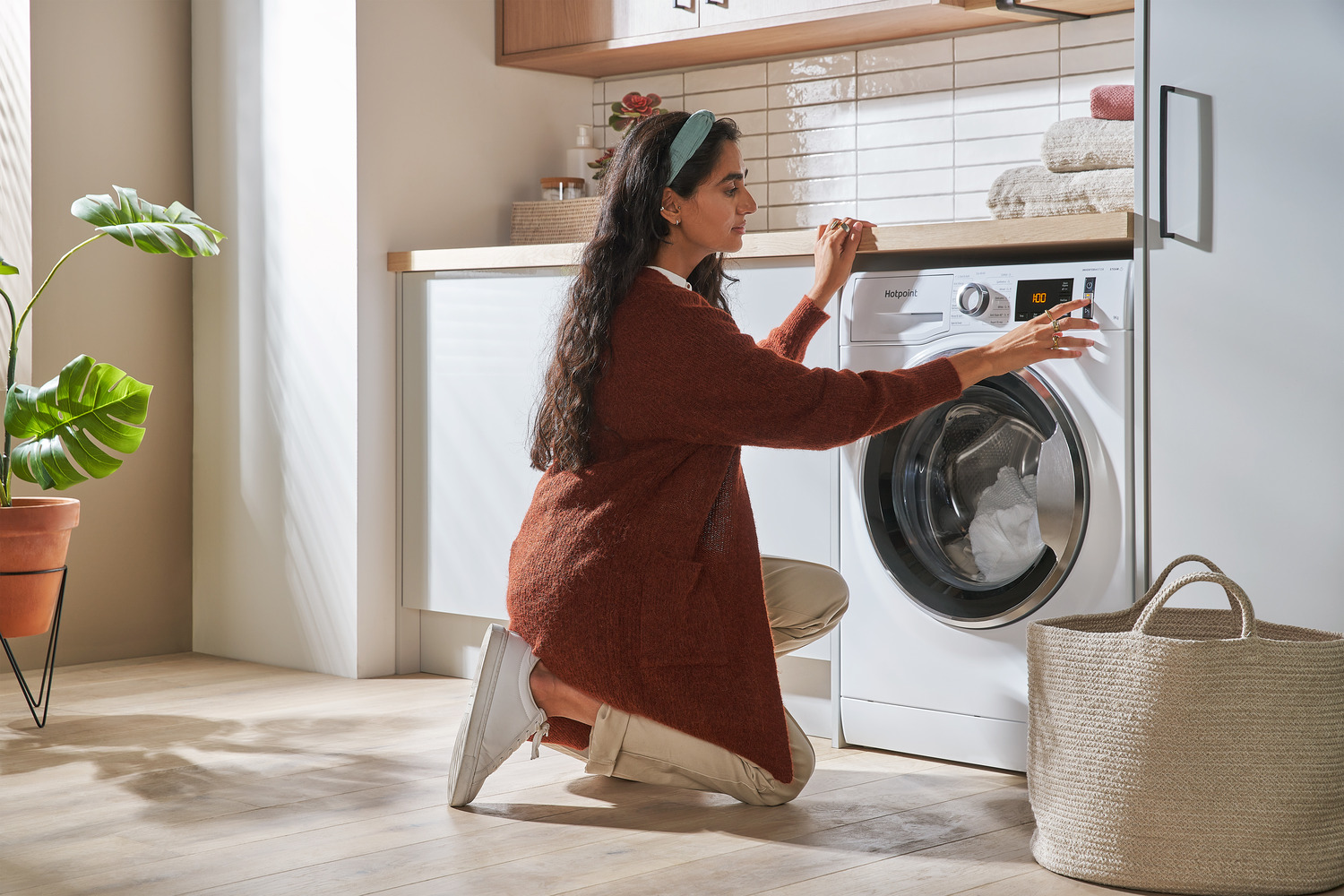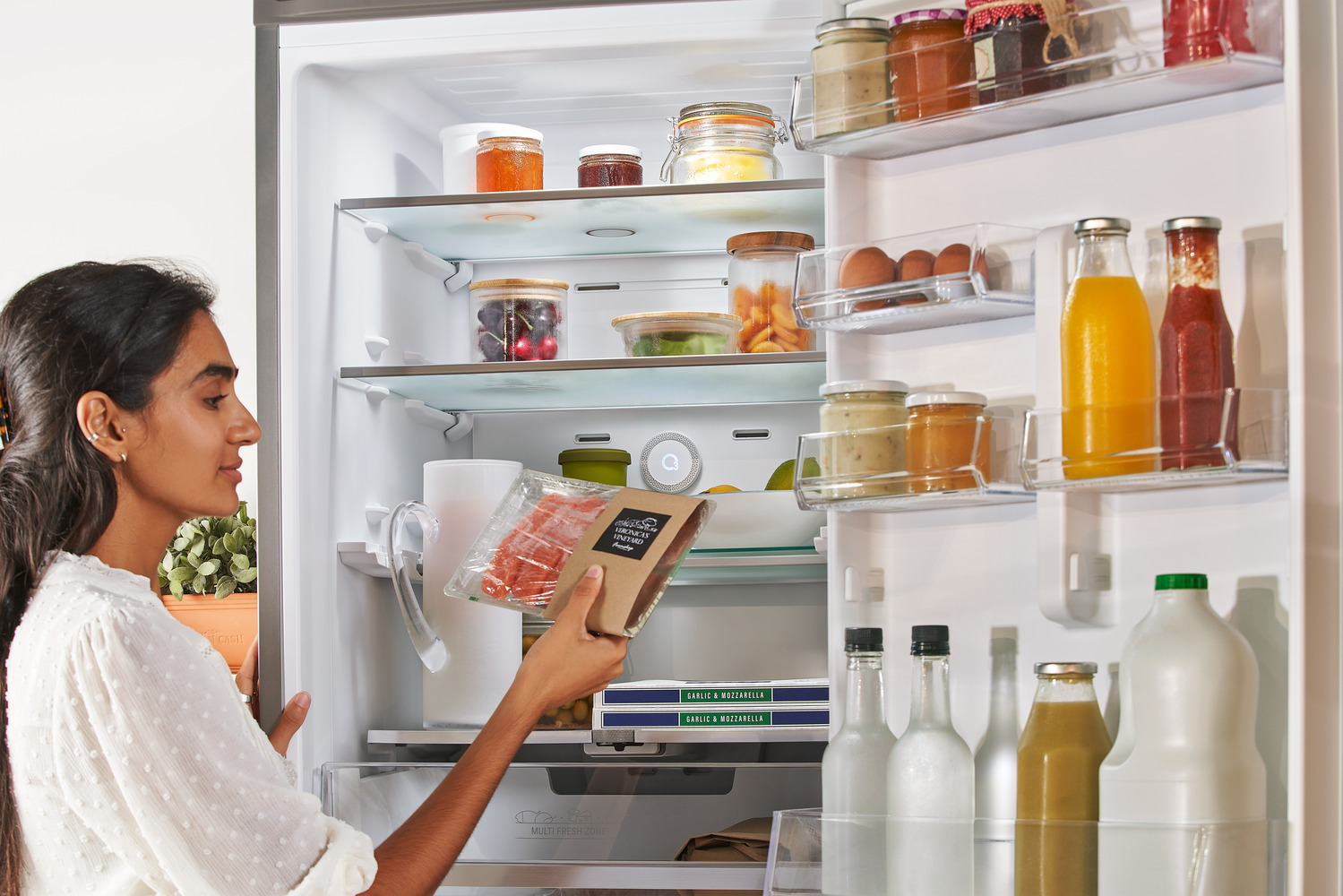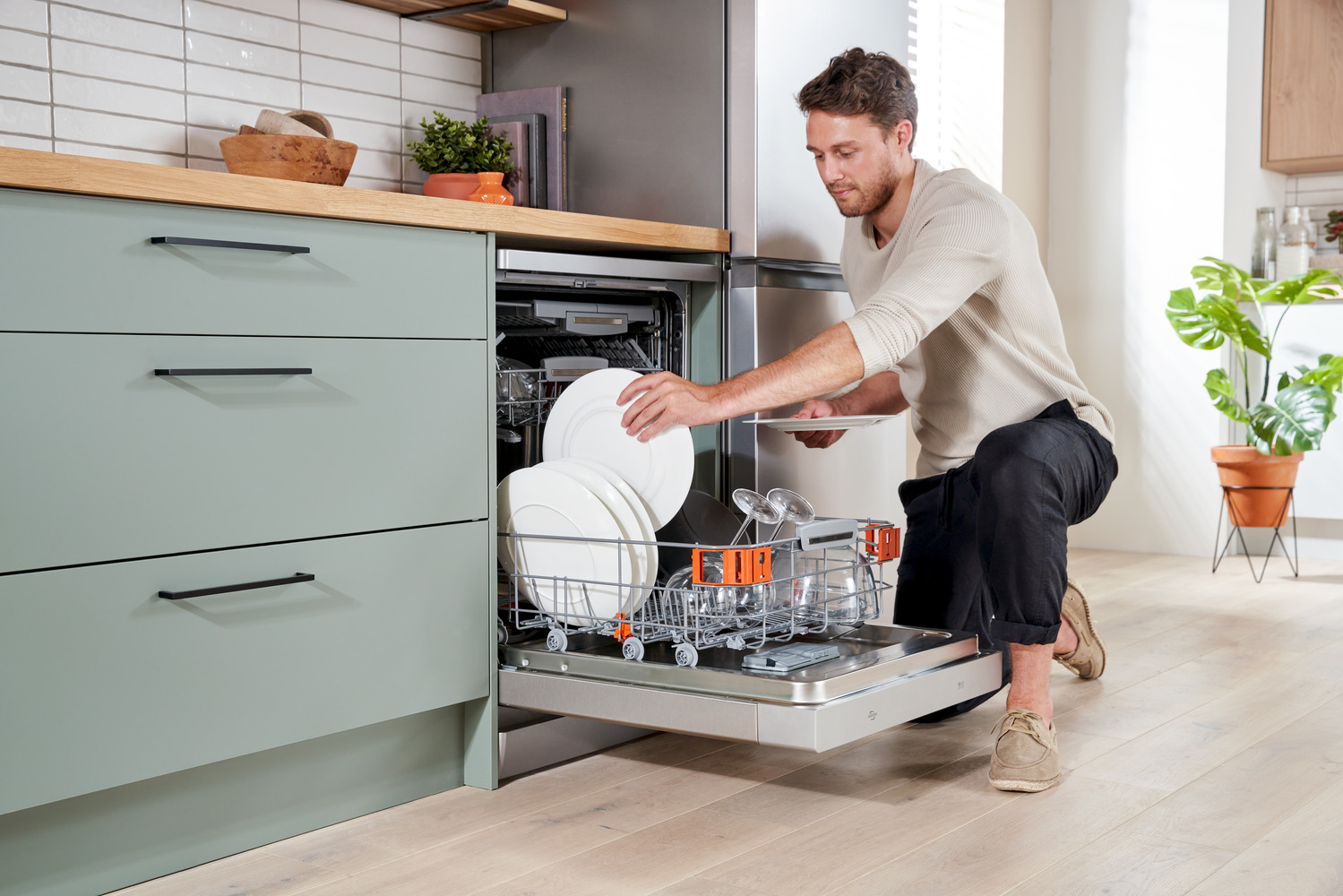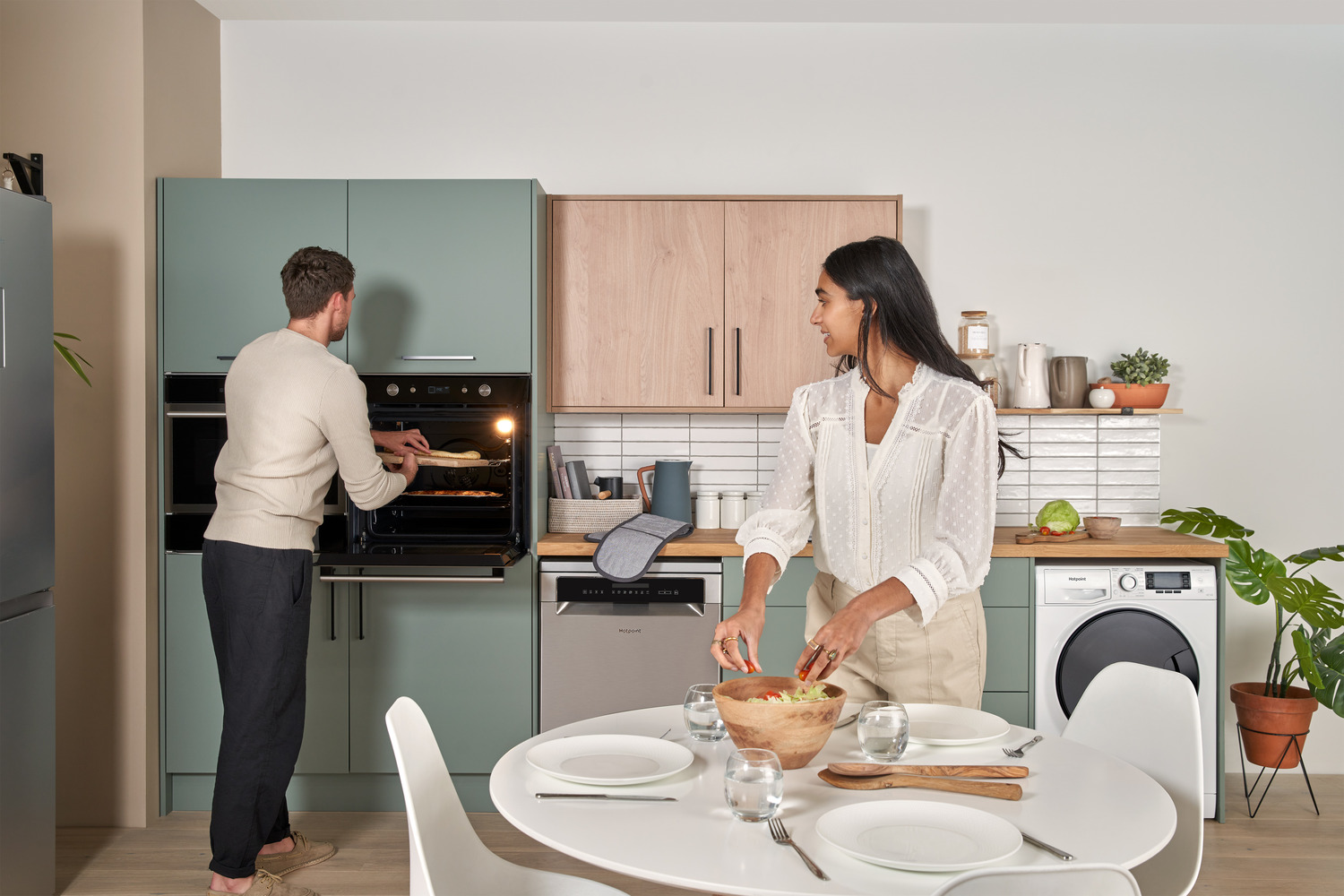Home appliances are a big investment, so it can be frustrating when they start to become less efficient — especially if this happens shortly after you've bought them. Whether your washing machine runs colder cycles than planned or your fridge freezer unexpectedly defrosts, it's never ideal when things go wrong.
That's why ensuring your appliances are well looked after is crucial. Using them efficiently and caring for them properly can save you money on energy bills and avoid unnecessary repair costs. Plus, it also means you won't have to replace them as often, keeping everything running smoothly for longer.
In this guide, Hotpoint's appliance experts have rounded up fifteen mistakes you could be making with your kitchen appliances — and shared their tips to help you avoid them.

Common Washing Machine Missteps
Your washing machine works hard to keep your clothes fresh and clean. However, many people don't realise that washing machines require some upkeep, and that neglecting simple maintenance can lead to frustrating issues — like clothes coming out of the wash still dirty or the machine developing a leak.
From how much detergent you use to how you clean the drum, looking after your washing machine can make all the difference in how well it runs and lasts. Here are some helpful washing machine tips to keep in mind when it comes to appliance maintenance:
1. Overloading your wash cycles
Overloading is when you throw too many clothes or other items into a single wash cycle. While it may seem like a time-saver when your laundry hampers are overflowing and you're short on time, overloading your washing machine can damage the machine and leave your clothes less clean!
When the drum is too full, your clothes can't move around properly, meaning detergent and water won't reach everything evenly. This affects the wash's quality and puts extra strain on your machine's motor and suspension systems, potentially leading to costly repairs.
"It's tempting to squeeze in a bigger load, but this can cause serious issues over time. Aim for about 8 to 10 kilograms for standard cotton and 4 to 5 kilograms for delicate cycles like synthetics and wool for the best results. This way, your clothes will have the space they need to be properly cleaned, and your machine will last longer," says Vivien Fodor, Laundry Category & TM Lead at Hotpoint."

2. Neglecting your cleaning routine
It's easy to forget that your washing machine needs to be cleaned, too. Over time, detergent residue, limescale, and bacteria can all build up inside the machine, leading to unpleasant smells and even transferring bacteria to your clothes. Regular cleaning keeps your machine smelling fresh and ensures it runs efficiently.
There are a few simple methods to clean your washing machine. Running an empty hot wash once a month with a specialist cleaner, like the Wpro Washing Machine Cleaner Tablets, is a quick and effective way to remove built-up grime. You should also regularly wipe down the door seals and detergent drawer to prevent mould and dirt from accumulating.
"Just like any other appliance, your washing machine benefits from a little TLC. Regular cleaning stops bad smells from developing inside the machine and helps it run more smoothly — preventing bacteria from building up. We recommend using a cleaning product every month to keep everything in top condition," says Vivien.3. Using too much detergent
It's easy to think that adding more detergent will lead to cleaner clothes, but using too much can have the opposite result. Excess detergent can leave residue on your clothes, making them feel greasy. Additionally, detergent can clog your machine's pipes and reduce the efficiency of your wash cycle. Over time, these clogs can cause leaks and blockages, leading to costly repairs or even a total breakdown of your machine.
"Many people guesstimate when adding laundry detergent to their machine, but this can lead to problems down the road. Overusing detergent can clog your machine's pipes and cause serious issues in terms of blockages deeper in the system," Vivien says. "Most modern washing machines are designed to use less detergent than you might expect, so always follow the recommendations on the detergent packaging. It's also important to factor in the size of your load and how dirty the clothes are."Fridge freezer habits that could be driving up your bills
Fridge freezers are generally self-sufficient once you've set them up and brought them to temperature, but that doesn't mean they're maintenance-free. Small issues, such as forgetting to close the door fully or accidentally knocking the temperature dial, can quickly drive up energy bills if they happen often.
By paying closer attention to how your fridge freezer runs, you can avoid unnecessary energy costs and ensure it works efficiently for longer. Let's take a look at some common fridge freezer maintenance mistakes:

1. Not checking your door seals
The door seals on your fridge freezer hold the cold air inside, keeping your food fresh. When they become worn or damaged over time, your fridge has to work harder to maintain the correct temperature, which can increase your energy bills. It's a good idea to check your seals regularly and ensure that the doors fully close whenever you get something out or put it away.
"Door seals are often overlooked, but they're a key part of keeping your fridge freezer working efficiently. If cold air escapes, the appliance has to work overtime to maintain its temperature, which can shorten its lifespan significantly," says Nevin Melcok, Refrigeration Category & TM lead at Hotpoint. "To test the seals, close the door on a piece of paper. If it slips out easily, the seals may need replacing. Keeping the seals in good condition is a simple way to help your fridge- freezer run smoothly and avoid extra costs."2. Choosing the wrong temperatures
Choosing the right temperature for your fridge freezer ensures your food remains fresh and your appliance runs efficiently. If the temperature is too high, food can spoil faster, while setting it too low can waste energy. Typically, it's easy for your fridge to maintain its temperature with very little energy output. However, accidentally knocking into the temperature dial will mean it has to adjust to a new temperature, before changing again once you've noticed food going bad or ice starting to form. This can require a lot of energy, negatively affecting your bills.
"For the best results, keep your fridge at around 3°C to 5°C and your freezer at -18°C. These temperatures are ideal for both energy efficiency and food preservation," Nevin explains. "Although many fridge freezers include adjustable temperature controls, it's best to stick to the recommended settings unless there's a specific reason to adjust."3. Forgetting maintenance defrosting
While most modern fridge freezers are frost-free, meaning they automatically prevent ice buildup by circulating air, some models still require manual defrosting. Ignoring this can cause ice to build up, making your fridge freezer work harder and use more energy. Over time, this can lead to inefficient temperature control.
"To keep your fridge freezer running as intended, defrost it at least once every six months or whenever you notice a significant ice buildup," Nevin advises. "Too much ice forces the appliance to work harder, which can lead to spontaneous defrosting if the ice is left to accumulate for a long time. Regular defrosting helps avoid. this problem and saves money on energy bills by keeping the appliance running efficiently."Simple dishwasher mistakes
Dishwashers have revolutionised the way many homes clean their plates and cutlery. These machines are more than just a time-saver; they're also much more efficient than washing dishes by hand — using less water and energy per cycle. However, regular care is essential to keep your dishwasher running as it should.
Simple care errors can reduce its efficiency and even lead to avoidable repairs. Let's dive into some easy-to-make mistakes and explore some helpful dishwasher tips:

1. Underloading your dishwasher
While it's tempting to run a dishwasher cycle with just a few items to save time, underloading is an inefficient way to use your appliance. Dishwashers are designed to clean a full load using minimal water and energy, so running them half-empty results in wasted resources that could've been used to clean more items.
"For the best results, wait until you have a full load before running your dishwasher. This helps to ensure that your cycle is as energy-efficient as possible," advises Dmitry Letsman, Dishwasher Category & TM lead. "Additionally, when items move around too much during the cycle, it increases the risk of breakages or dishes coming out less clean than expected. A properly loaded dishwasher helps protect your dishes and saves resources."2. Not using dishwasher salt
Dishwasher salt is essential to keep your dishwasher running properly. It softens the water, preventing limescale buildup on the heating element and internal components. Without dishwasher salt, limescale can quickly accumulate, causing your machine to become less effective with potential long-term damage. Using a product like Wpro Dishwasher Regenerating Salt can help keep your machine limescale-free.
"Many overlook the importance of dishwasher salt, but it plays a vital role in preventing limescale buildup, especially if you live in a hard water area," Dmitry explains. "Your dishwasher is fitted with a specific compartment for salt and cleaner, and it's recommended to check and refill the salt reservoir regularly to keep things running properly."3. Closing the door when not in use
It might seem natural to close the dishwasher door after emptying it, but keeping it open when not in use can prevent a number of issues. Closing the door traps moisture inside, leading to dampness, mould, and unpleasant odours over time.
"To avoid problems with damp and bad smells, we recommend leaving the door slightly ajar. This lets the interior dry properly, preventing moisture from building up and helping stop mould and mildew from forming," says Dmitry. "This simple habit will keep your dishwasher fresher and more hygienic in the long run."
Oven and hob blunders
Your oven and hob are often where you spend the most time in the kitchen, and they have an important job to do. A well-maintained cooker can last anywhere from 10 to 15 years, depending on the model and how frequently it's used, but many forget that it also requires care to keep it functioning correctly. Without regular cleaning and maintenance, your cooker can become less efficient — increasing your energy bills and even posing safety risks.
In this section, we'll cover some common oven maintenance mistakes:

1. Cooking in a dirty oven
Using your oven regularly inevitably leads to grease, grime, and food residue buildup. If left unchecked, this dirt can gradually block the oven's fans, causing smoke and unpleasant smells during cooking. This grime can also impact the taste of your food, leaving a slightly burnt flavour.
"To keep your oven safe and efficient, regular cleaning with the right products is essential," advises Zimbini Nkonjera, Cooking Category Manager at Hotpoint. "Grease and grime can block fans, leading to smoky kitchens. We recommend cleaning your oven regularly and checking before using it to make sure grease hasn't built up."2. Not replacing broken door seals
Oven door seals trap heat inside the oven, maintaining the correct temperature to cook your food thoroughly. Heat from the oven escapes once these seals become damaged or begin to wear out. This makes the appliance work harder and longer to reach and maintain the desired temperature, which not only leads to higher energy bills but can also cause unevenly cooked food.
"Damaged door seals can really impact the performance of your oven," Zimbini says. "If heat is escaping, your oven will take longer to cook and use more energy in the process. Regularly checking and replacing worn seals can help keep your oven running efficiently, saving you time and money."3. Using abrasive cleaning products
When cleaning your oven and hob, using the right products is essential. Abrasive cleaners may seem effective against baked on dirt and grime, but they can cause permanent damage to surfaces. Scratches not only ruin the appearance of your kitchen surfaces but can also affect how efficiently your hob can distribute heat.
"When it comes to cleaning your oven and hob, it's vital to avoid using abrasive cleaners. These can scratch and damage your kitchen surfaces, particularly on glass hobs," Zimbini advises. "Instead, you should opt for cleaning products that have been designed specifically for your oven and hob area. Not only does this remove the risk of damage, but it also ensures you're not introducing any harmful chemicals to the places where you prepare and cook food."Opt for gentle cleaning solutions specially formulated for your oven and hob, like the Wpro Ceramic & Induction Hob Cleaning Cream and the Wpro Stainless Steel Cleaner Spray. These products keep your appliances in top condition without damaging them.
General appliance errors to watch out for
While we've covered the most common mistakes for specific appliances, there are a few general habits that can affect the performance and lifespan of your white goods. Avoiding these common mistakes can help you get the most out of your appliances and ensure they continue working for years to come:

1. Not checking energy ratings
Each appliance has an Energy Label that shows how efficient it is, which can directly impact your energy bills. These labels use a colourful scale that ranges from G to A, though older items may go up to A+++. Appliances with a high rating, typically A to A+++, are more efficient and cost-effective to run. By choosing appliances with better ratings, you'll save on energy bills and reduce your carbon footprint.
"When buying a new appliance, always check the Energy Label," says Fergus Johnstone, Managing Director at Hotpoint. "Higher-rated appliances use less energy and can make a significant difference in your household running costs. Opting for an A-rated appliance might cost a little more upfront, but the long-term savings on energy bills make it a smart investment."2. Not replacing damaged components
Over time, certain components can wear out or become damaged — such as washing machine belts, fridge door seals, or oven heating elements. Ignoring these issues can reduce your appliance's performance and might cause breakdowns.
"You should replace worn or damaged components as soon as possible to prevent bigger, costlier repairs later on," says Fergus. "Ignoring a small issue can lead to more serious damage over time, which is why it's important to keep a close eye on your appliances to identify when it might be time to replace your components."If you need to replace a part of your Hotpoint appliance, we have a wide selection of spare parts to choose from.
3. Not checking the warranty when purchasing
When buying a new appliance, it's important to look at the warranty that comes with it. A good warranty provides you with peace of mind, protecting you from unexpected breakdowns or malfunctions that can't be fixed through regular maintenance.
"Choosing a product with a solid warranty is key to ensuring peace of mind when you're making a big investment in your kitchen appliances," says Martin Rogers, Head of Brand UK & Ireland at Hotpoint. "A strong warranty gives you confidence that, if something goes wrong, you won't face hefty repair costs. It's always worth considering this protection when making a new purchase, as it can save you significant expense in the long run."At Hotpoint, we offer a free 10-year parts warranty as standard, with an extended care plan that covers parts, labour, call-out charges, and accidental damage. With this additional plan, you'll be protected against breakdowns. If the appliance can't be repaired, Hotpoint will replace it free of charge.
Shop easy-maintenance appliances at Hotpoint
Taking care of your appliances is essential to make them last longer and perform at their best. Simple maintenance habits like keeping your washing machine clean or checking your fridge's door seals can save you from unnecessary repairs and help lower your energy bills. By making small adjustments and avoiding the common mistakes above, you can get the most out of your kitchen appliances for years to come.
If you're looking for tools and products to help make maintenance easier, browse our range of care accessories to keep your appliances in top shape. And if it's time for a new model, explore our selection of washing machines, ovens, hobs, fridge freezers, and dishwashers to find your perfect fit.
















.png)


